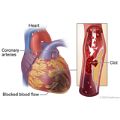Our Health Library information does not replace the advice of a doctor. Please be advised that this information is made available to assist our patients to learn more about their health. Our providers may not see and/or treat all topics found herein.
Topic Contents
Atherosclerosis
Condition Basics
What is atherosclerosis?
Atherosclerosis is sometimes called "hardening of the arteries." It occurs when fat (cholesterol) and calcium build up inside the lining of the artery wall. This forms a substance called plaque. Over time, the fat and calcium buildup may narrow the artery.
Atherosclerosis in the heart (coronary) arteries is called coronary artery disease. Atherosclerosis in the leg arteries is called peripheral arterial disease of the legs. If atherosclerosis affects the brain arteries (carotid or cerebral arteries), a stroke can occur.
If you have this buildup in one of your arteries, there's a good chance that you have it in other blood vessels throughout your body.
What problems can it cause?
Atherosclerosis can cause or increase the risk of other health problems. These include:
- Coronary artery disease.
Atherosclerosis affects the arteries that supply blood to the heart. These are called the coronary arteries. This can restrict blood flow to the heart muscle.
- Heart attack.
Plaque, caused by atherosclerosis, is surrounded by a fibrous cap. This cap may tear or rupture. When this happens, the body repairs the injured artery lining. It's similar to how the body heals a cut on the skin by forming a blood clot to seal the area. A blood clot that forms in an artery can completely block blood flow to the heart muscle. This can cause a heart attack.
- Stroke or transient ischemic attack (TIA).
When atherosclerosis affects the arteries that supply blood to the brain, it may cause a stroke or TIA.
- Peripheral arterial disease.
Atherosclerosis can affect arteries in other parts of the body, such as the pelvis and legs, causing poor circulation.
- Abdominal aortic aneurysm.
Atherosclerosis can make the walls of the aorta weak. This large artery carries blood from the heart to the rest of the body.
What causes it?
Atherosclerosis might start when the delicate inner lining of an artery is damaged. It might be damaged by things like high cholesterol, diabetes, high blood pressure, or smoking. Cholesterol in the blood moves into the wall of the artery and builds up.
This buildup of cholesterol seems to trigger inflammation and immune system responses from the body. These responses create plaque in the artery wall. Plaque contains fats, white blood cells, calcium, and other substances.
How is atherosclerosis treated?
Treating atherosclerosis may include having a heart-healthy lifestyle and taking medicines.
Atherosclerosis is a process. There are ways you can slow it down and help lower your risk for heart attack and stroke. A heart-healthy lifestyle can lower your risk. This includes eating heart-healthy foods, being active, staying at a healthy weight, and not smoking. All of these things have many benefits for your body, your heart, and your blood vessels.
If your risk for heart attack and stroke is high, you might also take medicines that lower your risk. Medicines may help reduce high cholesterol, control high blood pressure, and manage other things that increase a person's risk of heart attack, stroke, and other problems.
Related Information
Credits
Current as of: July 31, 2024
Author: Ignite Healthwise, LLC Staff
Clinical Review Board
All Ignite Healthwise, LLC education is reviewed by a team that includes physicians, nurses, advanced practitioners, registered dieticians, and other healthcare professionals.
Current as of: July 31, 2024
Author: Ignite Healthwise, LLC Staff
Clinical Review Board
All Ignite Healthwise, LLC education is reviewed by a team that includes physicians, nurses, advanced practitioners, registered dieticians, and other healthcare professionals.
This information does not replace the advice of a doctor. Ignite Healthwise, LLC disclaims any warranty or liability for your use of this information. Your use of this information means that you agree to the Terms of Use and Privacy Policy. Learn how we develop our content.
To learn more about Ignite Healthwise, LLC, visit webmdignite.com.
© 2024-2025 Ignite Healthwise, LLC.





